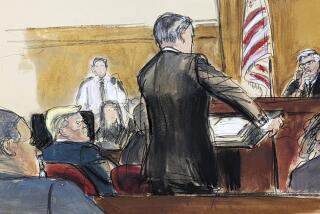Judge in Broadcom case retains his elusive streak
- Share via
U.S. District Judge Cormac J. Carney’s surprising rulings in the Broadcom stock options backdating cases didn’t come as much of a shock to some lawyers who have argued cases before him.
The judge, a former UCLA football star, isn’t afraid to follow his instincts when deciding a case, attorneys say.
“He has a strong sense of right and wrong,” said Thomas H. Bienert Jr. of the San Clemente firm Bienert, Miller & Katzman. “Judge Carney has shown a willingness to take a strong position outside the norm when he believes it’s the just thing to do.”
Carney is known for handing down stiff sentences, such as the 30-year prison term he gave in 2006 to 60-year-old Orange County swindler James P. Lewis Jr. -- a term that Lewis’ attorney argued amounted to “a death sentence.”
But Carney isn’t easy to pigeonhole.
Prosecutors wanted prison a few years ago for one of Bienert’s clients, but Carney noted that the defendant had cooperated with the government and, citing other factors, gave him probation, recalled Bienert, a former federal prosecutor.
Last year Carney declined to order a Washington Times reporter to reveal confidential sources to prosecutors, but not before questioning why it might be important for an investigative reporter to keep the identity of sources a secret.
The case was another example of the sort of judicial deliberation that “has left some people scratching their heads” at times, said Rick Pullen, a 1st Amendment expert and dean of the College of Communications at Cal State Fullerton.
“Some folks are purists and want judges to stick to the rules,” Pullen said. “But as we all know, the law is not as structured as some people think it should be. There are gray areas, and that’s why there are courts.”
Bienert said that while other judges are more likely to follow guidelines or the government’s wishes, “Judge Carney has demonstrated that he will take bold action even when it goes against the grain of what the government is asking for.”
That was certainly the case in the Broadcom trial.
Carney, saying Monday that prosecutors had intimidated witnesses and made “a mockery of justice,” dismissed the criminal case in which Broadcom Corp. co-founder Henry C. Nicholas III and the company’s former chief financial officer, William J. Ruehle, were accused of illegally backdating stock options. Last week, he threw out the conviction of co-founder Henry Samueli, saying he didn’t believe Samueli had committed a crime.
Carney, 50, the son of immigrant Irish parents, was born in Detroit but grew up in Long Beach, where he played football at St. Anthony High School. After an abortive stint at the Air Force Academy, he transferred to UCLA. When he graduated in 1983 Carney was the team’s all-time leading receiver with 108 receptions for 1,909 yards and was twice an all-Pac-10 selection.
Terry Donahue, Carney’s coach at UCLA, still has vivid memories of his star wide-out.
Donahue recalled the night Carney received an award at a sports banquet in Long Beach. UCLA had played Cal State Long Beach earlier in the season and a Long Beach player was seriously injured in the game. Carney accepted the award on behalf of the injured player and his family.
“It was one of the most moving and emotional moments that I’d ever had in athletics,” Donahue said. “You just don’t see guys do that. It made an indelible impression on me about Cormac Carney and the kind of man he was.”
A shot at pro football didn’t pan out, but a year playing for the Memphis Showboats of the now-defunct USFL helped pay for Harvard Law School.
After receiving his degree in 1987, Carney practiced at Latham & Watkins and O’Melveny & Myers. Gov. Gray Davis appointed him to Orange County Superior Court in 2001, and Donahue, as well as former U.S. Secretary of State Warren Christopher, spoke at his swearing-in ceremony. President George W. Bush nominated him to the federal bench barely a year later.
martin.zimmerman@
latimes.com
More to Read
Sign up for Essential California
The most important California stories and recommendations in your inbox every morning.
You may occasionally receive promotional content from the Los Angeles Times.










